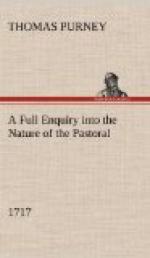’Tis true Indeed, I think it possible for a Novel, or perhaps a Poem, to contain a Story in a hundred Lines which shall be able to engage the Mind so as to delight it from the fable it self, stript of all its Ornaments. But how few in a hundred Ages have had Genius’s capable of this. And if ’tis difficult in a Novel or Poem, which may couch the Circumstances close together, how much more Difficult must it be in Pastoral. In the former Pieces nothing is to be observed but the Story itself, in the latter a thousand Beauties are to be adjoyn’d and as many Rules observ’d.
SECT 2.
The proper Length of Pastoral further collected from the Consideration of the Characters.
Another Pleasure which the brevity of these Pieces robs us of, is this. The Characters cannot finely and distinctly be depainted in so short a Compass. And ’tis observable, we are concern’d for the Personages in no Poetry so much as those of Pastoral. Simplicity and Innocence have Charms for every Mind, and we pity most, where most our Pity’s wanted.
So that the two noblest Beauties, and which constitute the main Difference between Poetry and Versification, between a perfect Poem and a Madrigal, Epigram or Elegy, are entirely lost in those Pieces, and the only Pleasure they can raise, must proceed alone from Sentiment and Diction.
SECT 3.
The Length of Pastoral, yet further shown from the Passions it raises.
In every rational and consistent Piece, the Writer has some Aim in View; as, to work every thing up to one End and a Moral Result; or to excite some Passion, or the like. Otherwise it is but an Assay of Wit, a Flirt of the Imagination, and no more. Too trifling to detain the rational Mind. Now, that these short Pieces are not capable of having a Moral, or raising any Passion, I need trouble my self for no other Proof than there never having been such one produced.
But give me leave to instance in the usual Method of forming a Pastoral. One Shepherd meets another; tells him some body is dead; upon which, they begin the mournful Dialogue, or Elegy. But in such an Elegy, there is but one thing can raise a fine Pleasure; which can be the only solid Reason for the Writers performing such a Work; and that is the raising Pity, without which no End is obtain’d by such a Dialogue. And ’tis only a School-Boy tryal of Wit; like a single Description. Unless the Poet think’s it enough that the Scene is laid in the Country, and the very Talk of Shepherds is enough to support a Piece. And the truth is, of a Nature so exceeding pleasant is Pastoral, that a Piece which has but Fields and Hedges repeated pretty often in it, is at least tolerable; whereas in any other Poetry, we see every day far better Poems cast out of the World as soon as they enter into it. But another reason of their Success proceeds from the little Knowledge most People have of Pastoral; all Poets having gone in exactly the same Track, without one endeavouring to raise the Poem to any greater Perfection than they found it in; whereas Epick Poetry, Tragedy, and Comedy, arriv’d by slow degrees to the Perfection they now bear; and this Writer still went beyond the last of an equal Genius.




